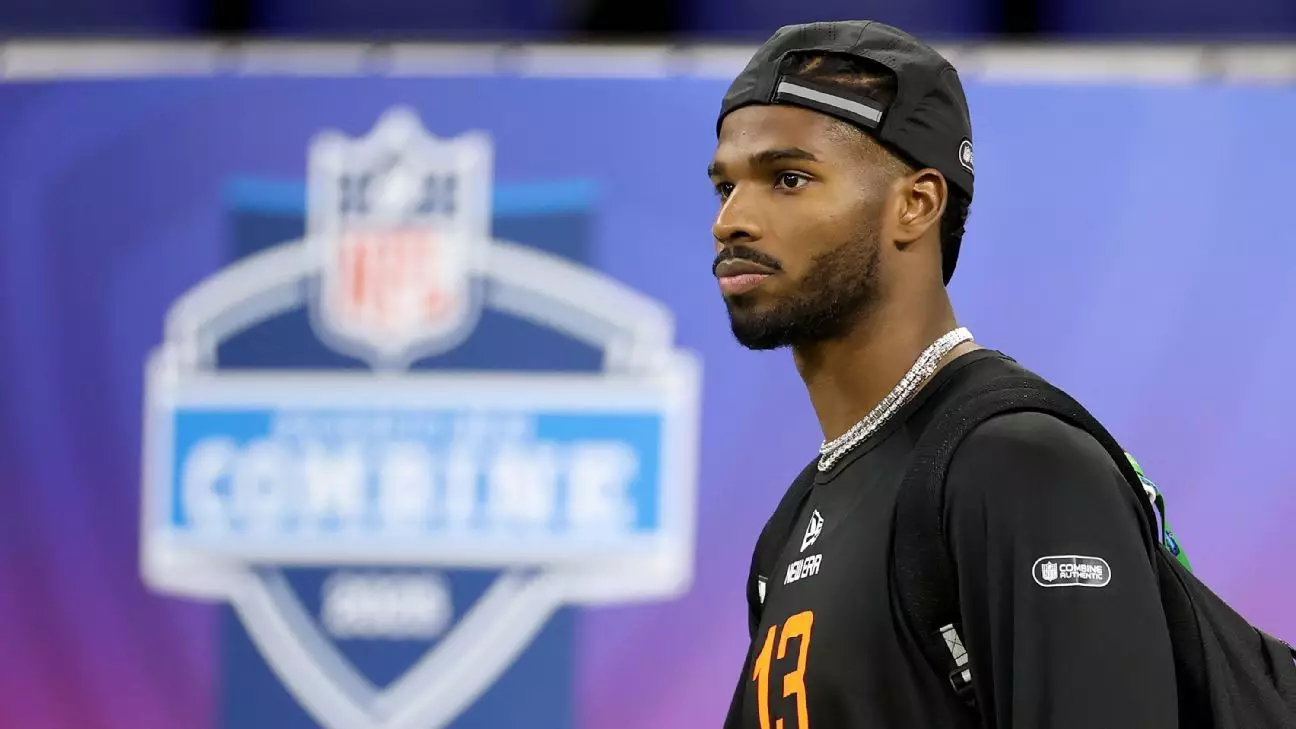In the high-stakes world of the NFL Draft, where dreams of football stardom hang in the balance, a reckless prank exposed not just the immaturity of one individual but also the vulnerabilities inherent in the league’s culture. The incident involving Jax Ulbrich, the son of Atlanta Falcons defensive coordinator Jeff Ulbrich, has ignited discussions about the acceptable boundaries of humor, particularly in a setting as crucial as a player’s draft day. Ulbrich’s admission to making a prank call to Shedeur Sanders, a highly touted quarterback, has thrust him into the unwanted spotlight, unveiling a narrative that is both embarrassing and revealing.
Upon receiving a call from someone impersonating New Orleans Saints GM Mickey Loomis, Sanders was understandably confused, trying to discern the reality from a moment clouded by anxiety and anticipation. For any aspiring athlete, the draft represents a culmination of years of hard work, sacrifice, and hope, making the intrusion of a childish prank not just inconvenient but decidedly disrespectful. Jax Ulbrich termed his actions as “completely inexcusable,” pleading for forgiveness from Sanders in an Instagram post that mirrored regret but also showcased the absurdity of his behavior.
The Fallout and the NFL’s Response
As news of the prank spread, it stirred up a whirlwind of implications for the Falcons organization, even prompting a responsive investigation from the NFL regarding the leak of Sanders’ private number. This breach of privacy adds another layer to the discussion—while humor and lightheartedness can have their place, when they infringe upon personal privacy and tarnish significant life moments, the narrative shifts dramatically. The Falcons acknowledged the breach of protocol, pledging to review their systems to prevent similar incidents. Yet, one wonders whether such administrative measures can truly deter reckless behavior born from immaturity.
Interestingly, Sanders himself responded with an unexpected level of grace. In a society where public outrage often overshadows humility, his calm dismissal of the prank reveals a maturity that transcends the childlike antics of Jax Ulbrich. Sanders articulated that he chose not to feed into negativity, embodying a resilience that many could learn from. However, the juxtaposition of his composed demeanor against Ulbrich’s admission of shame highlights a broader thematic concern—who bears the responsibility for maintaining the sanctity of important moments in life?
Culture of Pranks in Professional Sports
Prank calls during the Draft might appear benign, even amusing to some, but this incident raises essential questions about the culture within professional sports. Is this casual disregard for others’ significant moments merely a reflection of youthful exuberance, or does it signify something more problematic within sportsmanship ethics? After all, it is telling that while Jax Ulbrich’s actions have been labeled as immature, they resonate with a larger phenomenon—athletes often finding humor at the expense of their peers in a competitive arena where pressure and nerves run high.
Moreover, the incident shines a light on the reality that prank calls are not unique to Ulbrich. Other NFL draft picks, like Tyler Warren and Chase Lundt, have reported similar experiences, creating a troubling pattern. It raises a critical point: As athletes prepare for their moment in the sun, they are increasingly vulnerable to not just the pressures of performance but also the often toxic atmosphere created by their own peers.
Accountability and Growth
As the Falcons organization moves forward, the true test will be in how they leverage this experience for growth. While it is easy to dismiss Jax Ulbrich’s actions as an isolated incident fueled by immaturity, the responsibility rests with everyone in the NFL community to cultivate an environment where respect and understanding trump childish pranks. The tension between levity and accountability needs to be addressed critically; otherwise, the sport risks downplaying the very essence of what the draft symbolizes—a celebration of hard work, dedication, and achievement.
In examining this situation, one cannot help but wonder about the broader implications for other young players in similar positions. If the culture continues to perpetuate prankish attitudes, it risks normalizing behaviors that undermine the respect owed to every player’s achievements. As the lines between playful banter and disrespect blur, it is increasingly evident that the NFL must rise to the occasion and foster a climate where pranks give way to genuine camaraderie and respect—after all, in a league built upon teamwork, it is not just about the winning plays but also about uplifting one another in moments that matter the most.


Leave a Reply